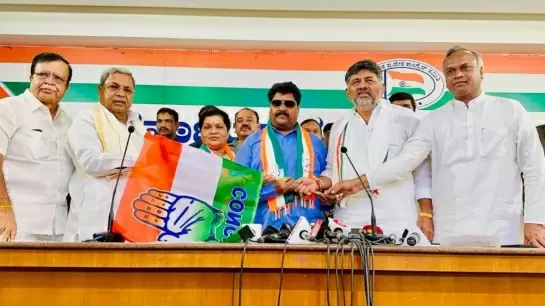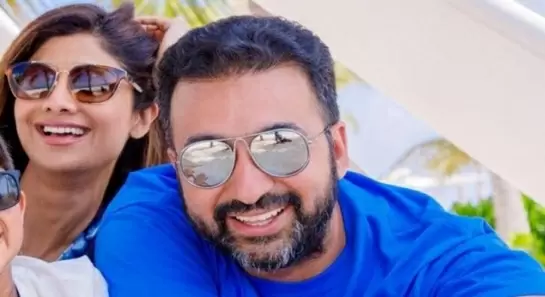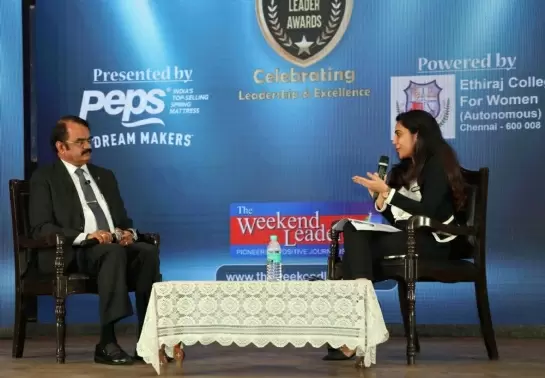Fixing through confessions and feelings of guilt
30-November-2013

Perarivalan is one of the three convicts facing Death Row in Rajiv Gandhi Murder case.
It is shocking that the confession statement obtained from him during investigation had been corrected by the CBI Superintendent of Police, V Thyagrajan. He has himself admitted to this.
It is a fact that it was this correction or omission in the confession statement which eventually led to the death sentence handed down by the Supreme Court for Perarivalan.
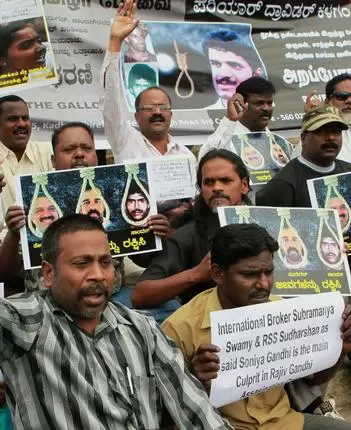 |
|
Tamil Nadu has witnessed several protests on the death sentences awarded to Perarivalan and three others
|
From the very beginning there were charges that Rajiv Gandhi assassination case had not been conducted properly. As per TADA (Terrorist and Disruptive Activities Prevention Act), the case hearings were conducted in the Special CBI court. Public were not allowed in the court.
The statement given by the accused in the presence of a Police official of the rank of a District Superintendent of Police was accepted as valid evidence. An appeal against the special court verdict rests only with the Supreme Court thereby excluding the jurisdiction of the high courts.
Following nationwide protest and the demand for the withdrawal of TADA, the Act was repealed in 2004. But, there was a saving provision that cases already registered under TADA can be continued. Accordingly many TADA cases are still under consideration. This is a matter of regret.
An appeal was filed in the Supreme Court against the decision of the Special Court which had awarded death sentence to twenty-six persons including Perarivalan.
A Division Bench headed by Justice K T Thomas of the Supreme Court annulled the death sentence in respect of twenty-two persons and confirmed the death sentence for four of them.
Even after the Supreme Court’s decision that the offence did not attract any terrorist crime, the case was not sent back to fresh trial consideration by an ordinary criminal court of a Sessions Judge.
Even under the Indian Evidence Act enacted during the colonial rule confession statements obtained by the Police from an accused cannot be accepted as valid evidence. This emphasizes the lack of faith of even the colonial rulers on the Police.
As there was scope to obtain confessions through torture with a view to establishing the guilt of the accused these confessions faced legal bars. But under TADA, confessions given to district level police officials could be accepted as valid evidence against the accused.
In the Kartar Singh vs State of Punjab case [1994] challenging the constitutional validity of TADA before the Supreme Court, the majority of four judges heading the constitution bench held Section 15 of the Act which made confessions before district Police officers not below the rank of SP admissible in evidence valid; however, Justice K Ramaswamy gave a minority judgment that this section was ultra vires.
The majority judges in the case had expressed their faith that IPS officials of rank of a SP would not indulge in such malpractices.
Justice K Ramaswamy had stated in a separate judgment that even such district level police officials would be inclined to obtain improper convictions by getting coerced confession statement, all with the view to finalizing criminal cases under their jurisdiction quickly. He had pointed to the potential for gross misuse of this section, with foresight. (See Box for relevant extracts from the judgment of Justice K Ramaswami).
|
Kartar Singh vs State Of Punjab Judgment Extracts
|
|
Para 453
“A conviction obtained unfairly has never been countenanced by a system which is wedded to rule of law. A police officer is trained to achieve the result irrespective of the means and method which is employed to achieve it. So long the goal is achieved the means are irrelevant and this philosophy does not change by hierarchy of the officers….
The Inspector of Police is as much interested in achieving the result by securing confession of an accused person as the Superintendent of Police. By their training and approach they are different. Procedural fairness does not have much meaning for them.”
Para 456
“A law which entitles a police officer to record confession and makes it admissible is thus violative of both Articles 20(3) and 21 of the Constitution.”
|
The statement of the officer who has confessed some twenty-two years after the investigation, that he had omitted a statement made by Perarivalan, goes to prove this point.
Even after the withdrawal of TADA, POTA [Prevention of Terrorist Act], and after its annulment UAPA [Unlawful Activities Prevention Act], have been in the field with similar provisions. This is an alarming situation.
The mercy petitions submitted to annul the death sentences in respect of the four accused (in the Rajiv assassination case) were rejected by the then Tamil Nadu governor Fatima Beevi.
The Madras High Court which took up the challenge made by Perarivalan and three other death row convicts held that the state government had acted without the cabinet advice and hence her decision was wrong and directed the Cabinet headed by Chief Minister Karunanidhi to examine the matter afresh.
The Tamil Nadu Cabinet recommended to the Governor to modify only the death sentence of Nalini and to reject the request of the other three. Only Nalini’s head got saved. The mercy petitions in respect of the other three were rejected by the President of India after keeping them in hibernation for nineteen long years.
Perarivalan’s attempt to know through the Right to Information Act, the nature of recommendation made by the Central government in this regard, was rejected by the Chief Information Commissioner.
Should there be a delay on the part of the President of India in deciding such mercy petitions, can this be considered as a factor to convert the death sentence into life Imprisonment is a question that is awaiting the decision of a Constitution Bench of the Supreme Court consisting of five judges.
The cases filed by the three convicts in the Rajiv Gandhi murder case are also included in the batch of those writ petitions.
Justice K T Thomas who was the Supreme Court judge heading the bench which had ordered death sentences to the four accused has now stated in an interview with Times of India that his decision ordering death sentences was a mistake.
D R Karthikeyan who headed the Special Investigation Team in the case, has stated in another interview that the death sentences to these convicts was excessive.
The CBI officer Thyagarajan, who had earlier recorded Perarivalan’s confession statement, has now stated in a public interview that he was admitting the mistake of having failed to record a proper confession statement, out of a feeling of guilt.
At least now, after all these strange developments, would the Central government grant mercy to these three convicts and release them from the death row?
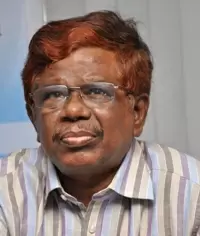 |
Justice K Chandru retired as judge of the Madras High Court in March 2013 after an eventful tenure in which he disposed of nearly 96000 cases. Many of his verdicts had a social impact. Justice Chandru maintained his simplicity in court. He had dispensed with the ceremonial carrying of the mace and had asked the advocates not to address him as ‘My Lord.’
After Six Years of Profitable Bootstrapping, Medulance Raises Rs 25 Crore to Expand Nationally
IIM Grad and First-Generation Entrepreneur Anish Popli's ProcMart Secures Rs 250 Crore in Series B Funding
First Indian Space Tourist Talks Dreams and Inspiration Before Blue Origin Flight
Former MLA Rathod Bapu Rao Switches from BJP to Congress in Telangana
Zerodha Co-Founder Nikhil Kamath Launches 'WTFund' to Support Young Entrepreneurs




